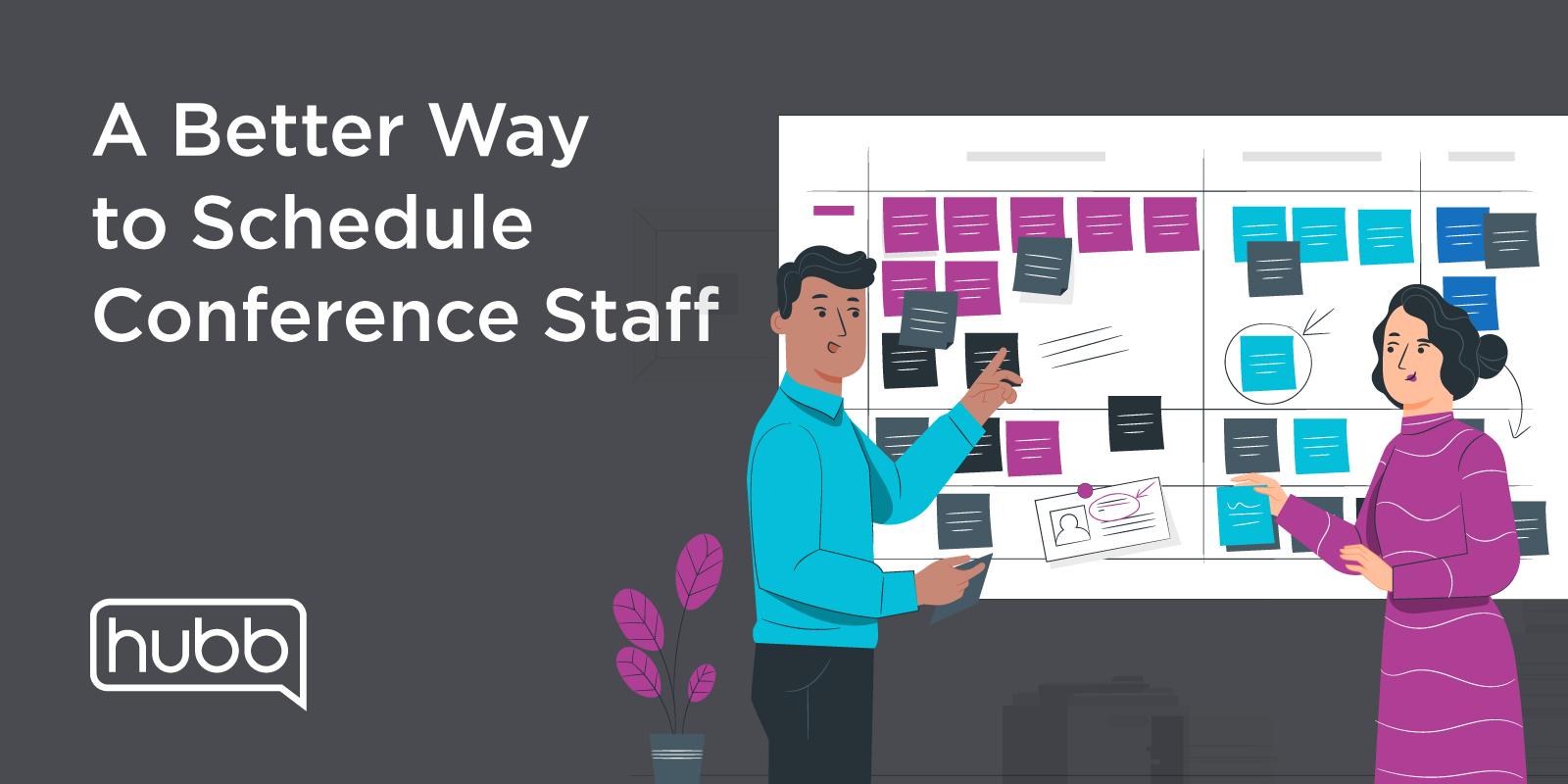
Let's talk about keeping conferences within budget and—don't laugh! It can be done. Yes, it's seriously difficult to bring a conference in on budget. But there is a silver lining: the reasons why conferences go over budget are predictable and common. Which means you can plan for them.
Having planned events for nearly two decades, I’ve accumulated my fair share of tricks for keeping things on budget. Here’s where I see event managers most commonly get in budget trouble and proactive solutions to keep things on track.

PROBLEM: You're answering to multiple stakeholders, each with their own priorities
HOW IT BLOWS YOUR BUDGET: Everybody insists their request is more important than everybody else’s. Accommodate everybody and you’ll have a classic too-many-chefs-in-the kitchen catastrophe.
SOLUTION: Have a very clear understanding of your event’s goals and objectives and weigh all requests against them. Also, recognize that every stakeholder feels that their requests take priority and that often stakeholder goals will not align with your goals. If stakeholder requests don’t help you achieve your goals, be prepared to say “no” or to add the request to your Trigger Budget (more on this in a moment). Sometimes stakeholders will try to strongarm you into approving their requests. Stand strong!

PROBLEM: Requested expenditures are well above your budget
HOW IT BLOWS YOUR BUDGET: You give your teams a budget and they come back and show you the shiny awesome thing you can get….for just 50% more.
SOLUTION: Use a trigger budget, which is essentially a list of requests that you track aside from your normal every day budget. Say signage teams says that for an extra $50,000, you can you get this extra amazing banner on the outside of the venue that would rock everybody's world. Well, that's great but it's $50,000 over their assigned budget, so you can't commit to that now. But you put it on your Trigger Budget, which is ranked by priority. The things that are going to have the biggest impact and most help your event reach its goals go at the top, stuff that's less important goes towards the bottom. Every time your event's financial situation changes, say revenues are higher than expected or something else comes in below budget, you move items off your trigger list and into the active budget.
Using a Trigger Budget allows you to avoid saying "no" to people, especially important stakeholders you'd like to accommodate; it’s a good way to say maybe. It also helps you to track and prioritize all the requests you get. And if the money is available, you know exactly where it should go to get the biggest bang for the buck. I don't think this is a common tool for event managers, but I use it and I find it to be indispensable.

PROBLEM: You underestimate how much the cost of doing business varies by city
HOW IT BLOWS YOUR BUDGET: Your event was in Dallas last year and everything was a-okay. This year you're in San Francisco. You get estimates and you do a spit-take; everything is three times as high! What gives!?
SOLUTION: Between differences in labor, taxes, lodging, food and beverage, and more, we often underestimate how much costs vary between cities. Prevent this from blowing your budget by not making assumptions about costs based on previous year's events when your event moves to a new city. Awareness of the issue is a major part of the solution. Always do your research on local costs!

PROBLEM: Spending too much on food
HOW IT BLOWS YOUR BUDGET: Food and beverage is one of our largest (if not the largest) expenses for a conference, so even small overages can have enormous repercussions. Say you want to provide slightly-fancier cookies. They’re only $2 an attendee more. How much can that hurt? Well, if you have 1,000 attendees across four days, that’s not cheap. And if you have 20,000 attendees…gulp…that's serious money!
SOLUTION: Take it back to your goals and objectives. In most cases, no matter how delicious, those fancy cookies aren't going to help you and your event meet your goals. Think: what is a better use of $5,000? Upgraded cookies or a more powerful event app?
To avoid spending too much on food, take a hard look at your plans; do you really need that third hot entrée? Do you need soup in addition to your other entrées? Will minor upgrades to food significantly fancier, up-leveled food significantly improve the attendee experience, or help move prospects through your sales pipeline? Unless the answer is a clear yes, this is an area ripe for cost savings.

PROBLEM: Actual costs come in higher than bids
HOW IT BLOWS YOUR BUDGET: The vendor's bid said one number but when you get the final invoice, it's substantially higher. The work has already been done, so cringe and pay it.
SOLUTION: Regularly update your budget with the latest information from vendors. Periodically (I like monthly), I have my vendors submit an updated bid based on changes that have come up since the last update. For me, this is regular part of my status meetings with vendors. If things DO cost more than expected—if a change I requested increased the budget or there was unplanned overtime required—I catch those issues early and I'm not caught off guard (and without money) when I get the final invoice.

PROBLEM: Changes in scope come down without an accompanying change in budget
HOW IT BLOWS YOUR BUDGET: You thought you nailed it…until a flurry of last-minute expenses put you in the red.
SOLUTION: Always have contingency money built in your budget. Whenever I plan an event, 3-5% of my total budget is set aside for last minute issues and changes. If I don’t use it, I come in under budget (and I look awesome). If and when last minute changes do happen, I’m prepared and I still come in at-or-under budget (and I look awesome).

PROBLEM: Revenue is lower than you expected
HOW IT BLOWS YOUR BUDGET: Your budget is a beautiful planned pie carefully proportioned out. Unfortunately, slower-than-expected registrations and sponsorships sale mean that pie is a lot smaller than you expected.
SOLUTION: Underestimate how much money you expect to come in and overestimate how much things will cost. I like to plan my budgets off 80% of expected revenue. Whatever the amount of revenue we project to bring in, I assume I'll only have 80% of it. This protects my budget in case registrations or sponsorships sales are slower than expected. If revenues are indeed as expected, or higher, then I get to pull in a bunch of items off my trigger list and make people happy.

PROBLEM: On-site changes are dramatically higher than you expected
HOW IT BLOWS YOUR BUDGET: You told your on-site vendors to "make it happen". They took that to mean "make it happen at any cost, without getting my approval first."
SOLUTION: Have structure to how your budget is managed on-site. Make it very clear to vendors there is a process for overages, and if they need to go over bid for any reason, they need to have an approved project change notification. I always have a designated person on-site whose job it is to manage those requests and keep things on budget.

PROBLEM: You're lacking a big picture view of your budget
HOW IT BLOWS YOUR BUDGET: Without a clear, everything-in-one-place view of your budget, you can't know where things stand. Are you under budget? Over? You're flying blind!
SOLUTION: You need your entire budget in one place. This is the one time I will recommend Excel. Get good at it and learn how to use Pivot Tables. There's a bit of a learning curve, but it's totally manageable and you'll quickly realize how powerful Excel is for this type of work.

You've probably noticed a few reoccurring themes. First, take things back to your goals and objectives. If the expense helps you meet your goals and objectives, it's probably worth fighting for. If not, you can try to cut back. Second, be conservative with your budgeting and assume expenses will come in higher than expected and revenues lower. Third, keep a close eye on your budget and bills. Things can very easily spin out of control, so you need to keep a close eye on things and make sure you have a plan to approve and track all expenses.
For more information, check out How to Plan a Successful Conference: A Step-by-Step Guide.
You've got your budget under control but how about the rest of the conference planning experience? Find tons of helpful advice in our Ultimate Guide to Conference Planning eBook!








